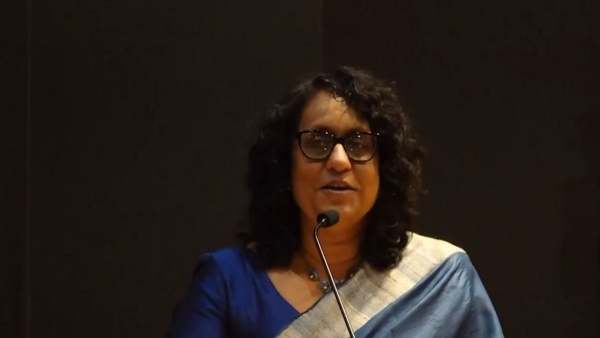
Sri Lankan PM and Hindu College alumna Harini Amarasuriya returned to her alma mater after three decades, evoking nostalgia and inspiring renewed academic collaboration. The college now plans exchange and research partnerships with Sri Lanka to strengthen India-Lanka educational ties, marking her visit as a symbolic bridge of friendship and learning.
New Delhi: In the early 90s, when the post-liberalisation era of India had just kicked in and smartphones were still years away, a young Sri Lankan student arrived at the Hindu College in Delhi, carrying with her a mixture of dreams, hopes and a bit of nervousness.
On Thursday, Harini Amarasuriya visited this prestigious institution as the prime minister of Sri Lanka in a ceremonial convoy, as the college described it as a "remarkable homecoming" of a "distinguished alumna".
Amarasuriya spent over two hours in the sprawling campus of the Delhi University college, and even returned to classroom no. 27 and sat at a desk, where over three decades ago, she had spent formative years of her life, pursuing a Bachelor's degree in sociology from 1991 to 1994.
Principal Anju Srivastava, who welcomed and accompanied her throughout the visit, described it as a "proud moment" and a "milestone occasion" for the 126-year-old college and feels it could serve as a fulcrum to bolster education cooperation between the two countries.
Interacting with PTI shortly after the visit, she said, the Hindu College seeks an exchange programme as well as research collaboration with Sri Lanka.
The principal said this was brought up during her interaction with the Sri Lankan prime minister during the visit.
"We have talked with her (Amarasuriya) about it, details of that will only come later, but we are entering into some kind of a dialogue with her, for both the exchange programme and collaboration for research.
"Earlier also, we have sent one proposal to her, which she has said she will give it a very, very serious consideration," Srivastava told PTI.
After addressing students at the Sanganeria Auditorium, post a red-carpet welcome and a guard of honour by NCC cadets, Amarasuriya visited her old classroom and interacted with teachers and some of the current students.
In recognition of her accomplishments, Amarasuriya's name has been affixed to the social and ethnographic research lab of the sociology department, which she also visited and unveiled a plaque there.
Aakriti Kori, a third-year student of the sociology department, who gifted the Sri Lankan PM a black and white sketch portrait of her at the lab, was filled with excitement and pride.
"I had a train today for my hometown in Madhya Pradesh. But I stayed just because of her visit and to gift her my artwork. The PM, who studied in the same department as I, felt so happy to see it and told me that she would take it back home with her," she told PTI on Thursday.
The exchange programme and collaborative research being envisioned by the college aim to further solidify this nostalgic bond with academic and institutional cooperation and enhanced people-to-people ties with the neighbouring country.
Amarasuriya said she arrived in Delhi in the 1990s as a student on an ICCR (Indian Council for Cultural Relations) scholarship and carried with her a "mixture of dreams, uncertainties, hopes, questions and also more than a little nervousness".
"As I entered the college through the very same gate today, I was filled with nostalgia and admiration," she said.
The Sri Lankan PM struck an instant bond with students in her over 20-minute address, imbued with nostalgia, as she recalled eating 'chhole bhature' or visiting Jaisingh's tea stall and countless conversations she had with other students on inequality, feminism, human development, films, politics and theatre, on the college lawns.
She said her joining politics in 2020 "was not a leap", as described by some, and it was not an "abandonment of academia, but an extension of it".
"The academic bearings instilled in me at the Hindu College were never far from me," the proud alumna said, drawing applause from the audience.
To accentuate the feeling of nostalgia, the college hosted a luncheon for her, and she was joined by some officials from the Ministry of External Affairs, the principal, some teachers, including one who taught her in the 1990s, and the 'prime minister' of the college parliament.
"The menu offered chole bhature, which she ate fondly, sarson ka saag and makke ki roti, pav bhaji, and kheer," the principal said, highlighting that despite Amarasuriya's inspiring journey, she still remembers the old days and feels attached to the college.
In her address, Amarasuriya emphasised that for India and Sri Lanka, "opportunities are boundless".
"As we enter a new era, it is important that the two countries strengthen our economic ties, enhance people-to-people connection through exchanges like these, and advance regional and global cooperation," she said. The future holds "immense potential" and "we must work together" to realise it, the Sri Lankan PM asserted.
The strength of the Sri Lanka-India partnership lies in "our collective actions and our shared commitment" to address challenges that transcend borders, from environment and maritime issues to counterterrorism, she said.
Describing the island nation as a "country of ideas", she urged to look at Sri Lanka as a "collaborator" and a "partner".
To the students, she said, they stand at the "threshold of extraordinary possibilities".
"The education at the Hindu College is a gift, but it is also a responsibility. Use it wisely; use it to build bridges, not walls; use it to heal divisions and not deepen them, and use it to serve and not just to succeed," the Lankan PM said.
(Except for the headline, this article has not been edited by FPJ's editorial team and is auto-generated from an agency feed.)